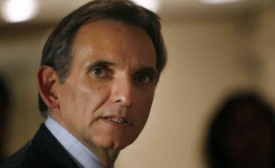journalism
Rio Doce, a publication for Sinaloa, Mexico, interviewed CPD Director Philip Seib about the recent release of cables by WikiLeaks and its effect on the relationship between Mexico and the U.S.
Last week's two-day conference, “International Encounter of Journalists: Media Treatment of the Middle East,” was organized to “create a space for reflection and meaningful dialogue about media treatment of the Middle East and its influence on Spanish public opinion.”
The United States will provide 125 scholarships to Pakistani journalists during 2011 as part of public diplomacy and capacity building cooperation, Federal Information and Broadcasting Minister Qamar Zaman Kaira said after leading discussions with senior American officials on public diplomacy.

The USC Center on Public Diplomacy was pleased to host Ambassador Carlos Pascual, U.S. Ambassador to Mexico for a talk titled, "Journalism, Human Rights, and Security in Mexico: Current Challenges for U.S. Public Diplomacy".
About Carlos Pascual
The peace process has been major news in almost all Arab media before, during and after direct negotiations started between the Palestinians and the Israelis. In broadsheet newspapers it is front page news; in broadcast media it usually comes first or second. The mood of the commentary and analysis was quite ambivalent.
For decades Xinhua has been an unavoidable presence in China. It has a monopoly on official news and the regulatory power to complicate life for other media outfits. But as China has grown in wealth and international stature, Beijing has tired of feeling overlooked or maligned by the Western press.







